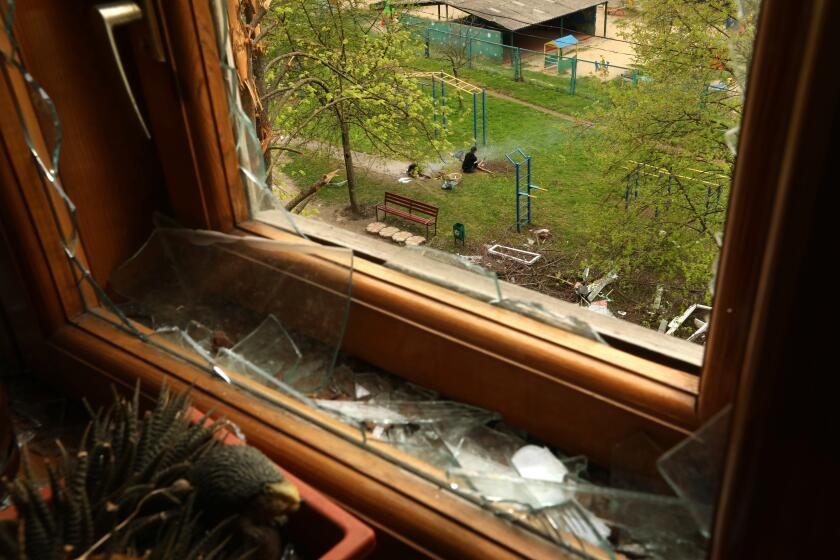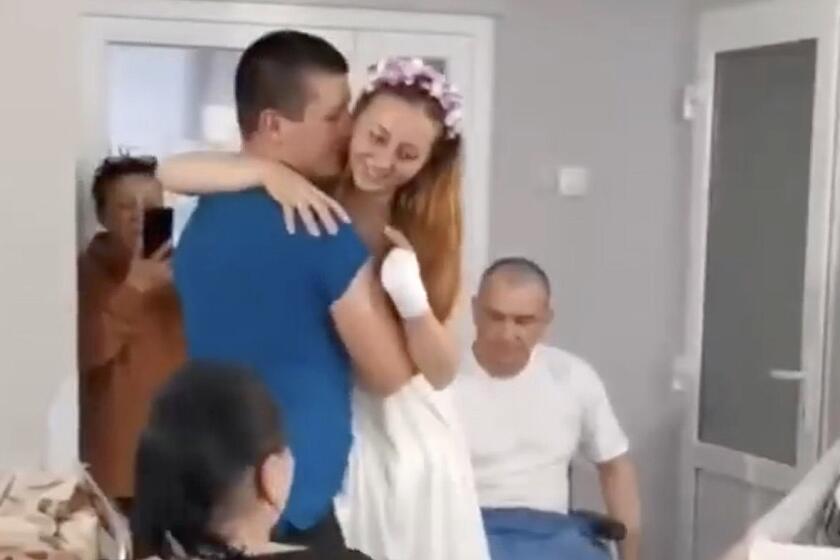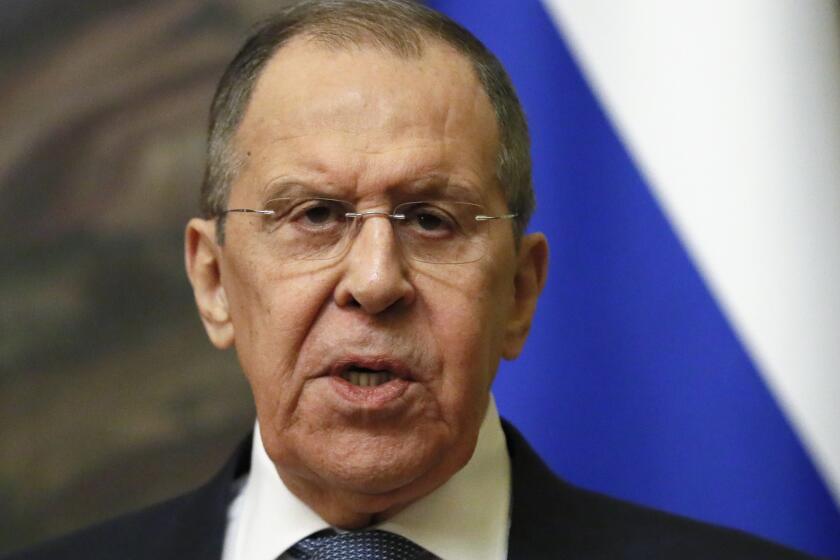Port city Mariupol under renewed Russian fire after evacuations; more attacks in the east
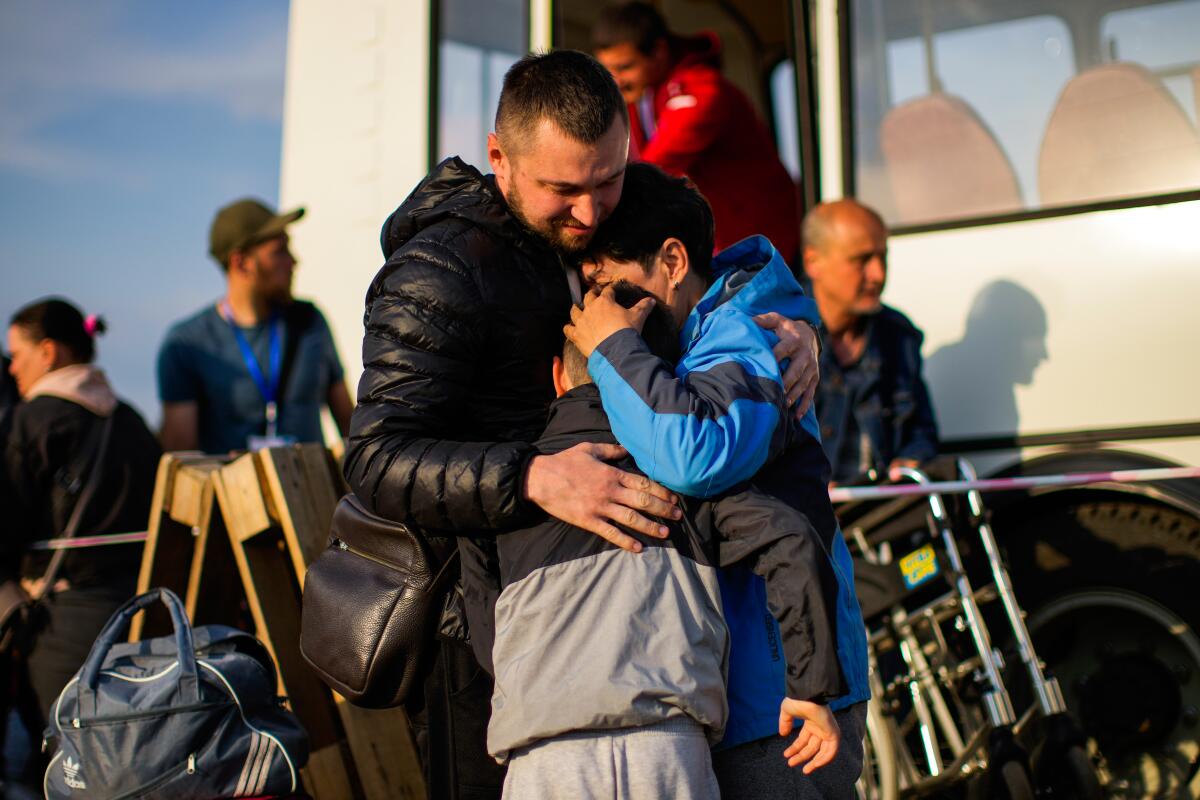
- Share via
KYIV, Ukraine — Russian forces renewed bombings in the brutalized city of Mariupol on Tuesday and pressed their assault on Ukraine’s eastern heartland, according to Ukrainian officials who described the death and destruction that ensued.
Small numbers of civilians managed to escape Mariupol and reach safety despite the new attacks, which probably doomed additional evacuations. Other evacuees were diverted to Russian-held territory, Ukraine said.
Elsewhere, the Ukrainian military said Tuesday that 12 attacks were repelled overnight in Luhansk and Donetsk, the two districts that make up the eastern industrial Donbas area. U.S. officials now say they believe Russian President Vladimir Putin plans to annex large chunks of the Donbas region.
Ukrainian officials also reported new shelling in Izyum and in Kharkiv, Ukraine’s second-largest city, which has endured some of the most vicious assaults since the war began Feb. 24. The attacks could not be independently verified. In a speech Tuesday, Ukrainian President Volodymyr Zelensky said Russian shelling had “burned, destroyed or damaged” one-fifth of all houses in Kharkiv — more than 2,500 homes.
And Mariupol, Zelensky said, was “completely destroyed.” He was speaking via video to the parliament of Albania.
At least 100 civilians have been evacuated from their shelter at the Azovstal steelworks in Mariupol since Saturday, but no sooner had one evacuation been completed than Russian forces shelled and then began storming the massive plant where the last Ukrainian fighters — and many civilians — were holed up, according to Ukrainian officials.
Ukrainian media quoted a commander at the Azovstal factory as saying that Russian forces were bombing overnight and “now the occupiers are trying to break into the plant.” Later reports said at least two Ukrainian women were killed in the renewed attacks.
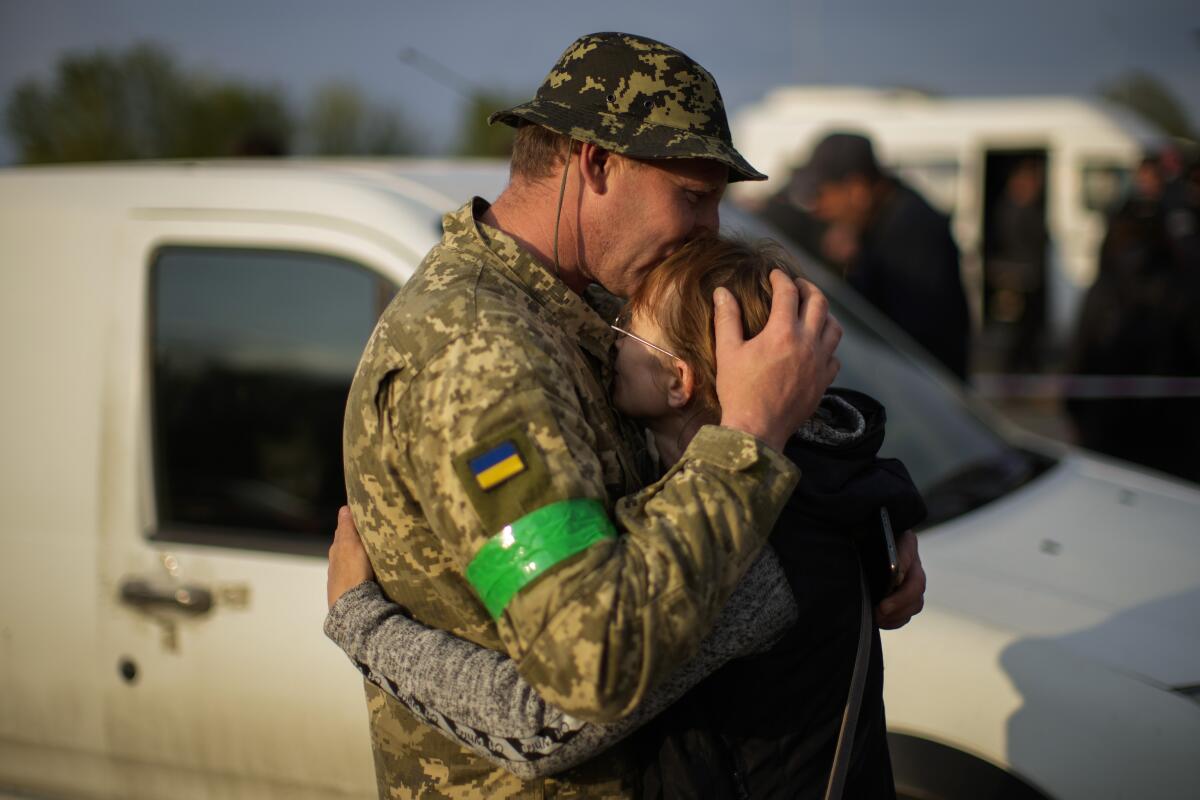
Just hours earlier, dozens of exhausted residents of Mariupol arrived at the interior city of Zaporizhzhia after their rescue from the steelworks where they had taken shelter, along with local fighters, under the auspices of the United Nations and the International Committee of the Red Cross.
“Things are moving,” said Dorit Nitzan, the World Health Organization’s incident manager for Ukraine, speaking to reporters in Geneva by video. “We know that they are on their way.”
If Kharkiv has been a target since Russia invaded Ukraine, then the district of Saltivka is the bull’s-eye, which diehard residents refuse to leave.
Some evacuees were also reportedly moved to a village under the control of Moscow-backed separatists. The Russian state news agency Tass has said that more than 1 million people from war-torn areas of Ukraine have been taken to Russia in the last nine weeks; Ukraine has alleged that at least some of those transfers have been forced, which Moscow denies.
“It is no coincidence that the Russian occupiers are creating so-called filtration camps on Ukrainian land through which thousands of our Ukrainian citizens are passing,” Zelensky declared in his nightly video address, “where our people are killed, tortured and raped. It is no coincidence that the occupiers capture civilians and take them hostage or deport them as free labor.”
In his speech to the Albanians, Zelensky called on Europe to close its ports to Russian ships, its cities to Russian tourists, its banks to Russian money.
“However difficult it may be, it is necessary to deliberately restrict trade with the Russian Federation,” he said. “Because if not today, then tomorrow Russia will consciously use trade ties to hit your market when it wants some political concessions from you. You need to deprive it of this tool in time.”
As he has done in speeches to other world leaders and lawmakers, Zelensky tailored his remarks to his audience, sending holiday wishes to the predominantly Muslim country as it celebrates Eid al-Fitr, which marks the end of the holy month of Ramadan, and referencing the Albanian nun Mother Teresa.
Meanwhile, British Prime Minister Boris Johnson delivered an address Tuesday to the Ukrainian parliament by video from London, during which he commended the country’s resistance to the Russian invasion as “Ukraine’s finest hour,” in an echo of Winston Churchill during World War II.
A video of Oksana Balandina, who lost both legs to a land mine, and Viktor Vasyliv dancing at their hospital wedding has lifted spirits in Ukraine.
“I have one message for you today: Ukraine will win,” Johnson said. “Ukraine will be free.”
Johnson announced a $375-million package of new military aid to supplement assistance to Kyiv that has already included missiles and missile launchers. The new package will include electronic equipment and night-vision devices.
“Though your soldiers were always outnumbered … they fought with the courage and the energy of lions, and you’ve beaten them back from Kyiv,” Johnson added. “You have exploded the myth of Putin’s invincibility, and you’ve written one of the most glorious chapters in military history and in the life of your country....
“You’ve proved the old saying: It’s not the size of the dog in the fight; it’s the size of the fight in the dog.”
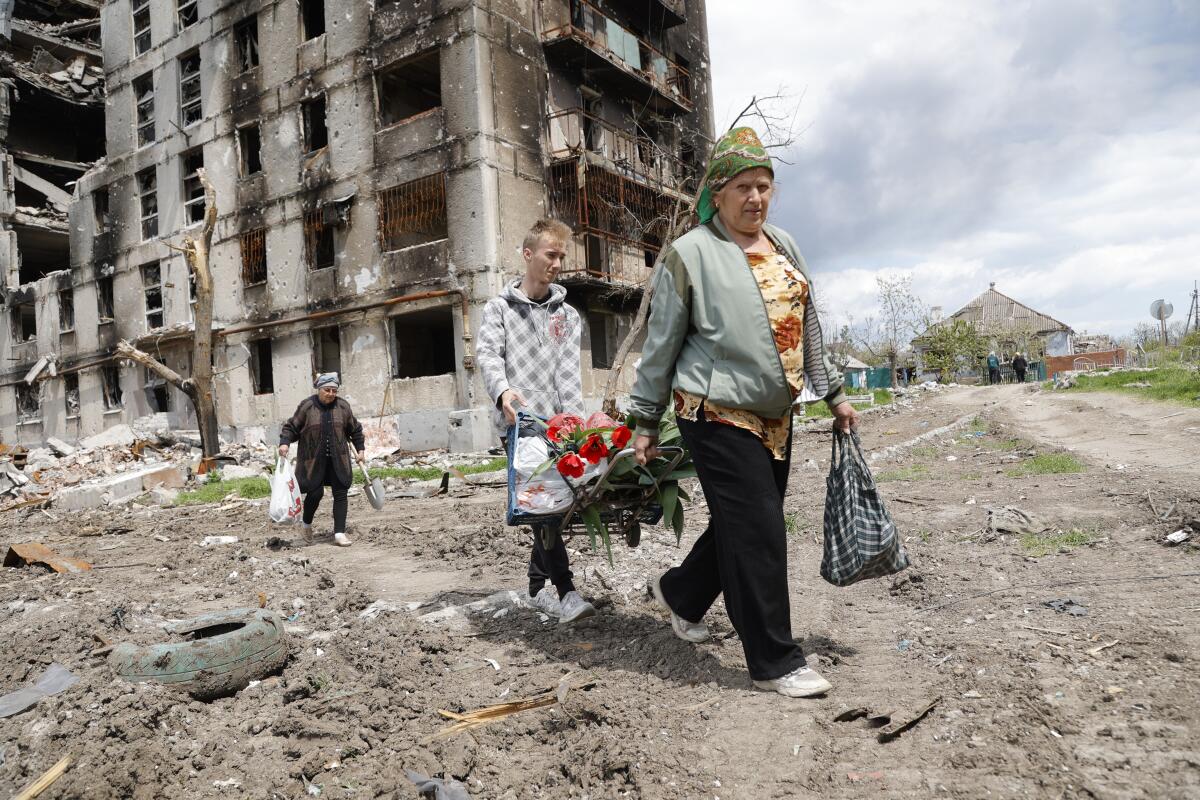
U.S. and British military analysts say Russia’s advances are sluggish because of failures in strategic planning and operational execution. In an assessment released Tuesday, the British Defense Ministry estimated that one-fourth of Russia’s forces in Ukraine have been rendered “combat ineffective.” A senior U.S. Defense official described the Russian offensive in eastern Ukraine as “anemic.”
The Ukrainian military also claimed that Russian artillery hit a school compound in the region near Zaporizhzhia, killing two people.
Russia’s top diplomat presses Moscow’s line that Ukraine harbors Nazi elements, saying President Volodymyr Zelensky’s Jewish origins are meaningless.
After touring a Lockheed Martin factory in Alabama on Tuesday afternoon, President Biden urged Congress to fund his request for an additional $33 billion in military and humanitarian aid for Ukraine — an amount the U.S. believes will be necessary over the next five months as the war becomes a protracted conflict. The more than $3 billion in security assistance that the U.S. has already provided Ukraine is a “direct investment in defending freedom and democracy,” he said.
Biden told workers at the factory that the antitank missiles they make helped Ukrainian fighters “have a shot” against Russia’s invasion.
“This fight is not going to be cheap, but caving to aggression would even be more costly,” he said. “We either back the Ukrainian people to defend their country or we stand by as Russia continues its atrocities and aggression.”
Biden praised the bravery of the Ukrainian people, calling the war an “inflection point” in history.
“We built the weapons and equipment that help defend freedom and sovereignty in Europe years ago,” he said, referring to World War II. “That’s true again today.”
Discussions over military aid also took place in Washington, where Joint Chiefs Chairman Mark A. Milley and Defense Secretary Lloyd J. Austin III on Tuesday testified on the Pentagon’s budget.
Addressing the Senate Appropriations subcommittee on defense, Austin urged the legislators to quickly pass the $33-billion budget request, which he said “will help us continue to meet Ukraine’s urgent requirements without interruption.”
“The war is changing, and the coming weeks will be crucial,” he said.
As the war’s effects jeopardize food supplies around the world, the U.S. said its focus at two U.N. events this month will be on the Russian invasion’s impact on food availability.
U.S. Ambassador Linda Thomas-Greenfield told reporters that Secretary of State Antony J. Blinken will chair a May 18 meeting on food insecurity across the globe to “review urgent humanitarian needs.”
“Ukraine, as you all know, used to be a breadbasket for the developing world, but since Russia has spurred the largest refugee crisis in Europe since World War II, blocked crucial ports and destroyed civilian infrastructure and grain silos, desperate hunger situations in Africa and the Middle East are getting even more dire,” she said.
Prospects for diplomacy forging a cease-fire — much less a resolution — seemed dim as the war approached its 10th week.
Even Pope Francis’ efforts have fallen short. Francis told the Italian newspaper Corriere della Sera in an interview published Tuesday that he wrote Putin in mid-March offering to travel to Moscow and mediate in the conflict.
Putin never answered, the pope said.
King reported from Lviv and Kyiv, Wilkinson from Washington, Chu from London and Parvini from Los Angeles.
More to Read
Sign up for Essential California
The most important California stories and recommendations in your inbox every morning.
You may occasionally receive promotional content from the Los Angeles Times.
